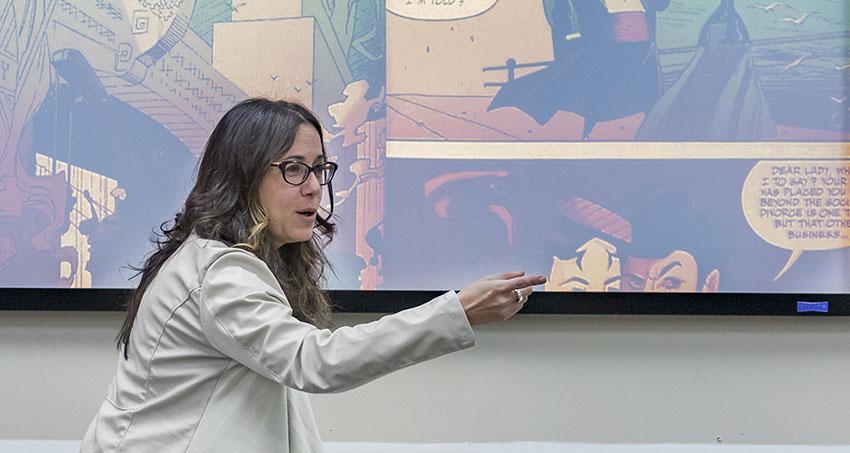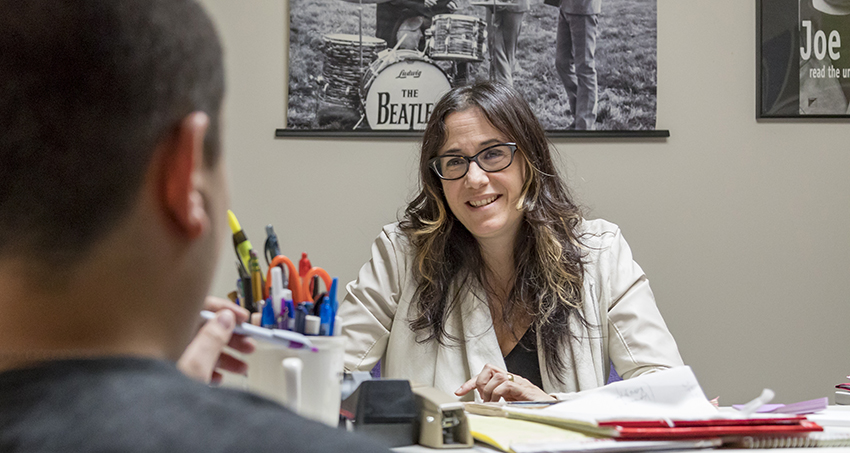Practicing the Art of the Remix
Muhlenberg professor and author Francesca Coppa on community, collaboration and fanning the fanfiction zeitgeistBy: Shelley Drozd Monday, April 16, 2018 09:35 AM

Francesca Coppa lectures to her class inside a semi-circle of 16 desks. The professor of English moves through the space with kinetic energy, rapid-fire repartee spilling out of her. So eager are Coppa’s students to join the conversation that hand-raising seems optional in her Literary Remix class.
On a screen behind Coppa is a spread from the graphic novel, “The League of Extraordinary Gentlemen” by Alan Moore. At first blush, the class appears to be studying a comic book. Upon closer inspection, it’s clear that the speech balloons and starkly-drawn cartoons make for a rigorous exercise in literary analysis and critique.
Coppa challenges the students to find the allusions in the graphic novel. Some are subtle, such as the towering, half-finished structure in one background—a bridge stretching toward France that tells us that this isn’t the British Empire we know, but a bolder, more dominating one.
Other allusions are obvious. No one in the class misses the nod to a famous first mate, even though he’s patently out of context. “‘Call me Ishmael.’ You know the line before you read it,” says Coppa. She quickly moves on. “What else did you catch?”
What’s catchable is a cast of characters that reads like a who’s who in Victorian-era fiction, from Mina Murray and Allan Quartermain to Captain Nemo, Jekyll and Hyde, and The Invisible Man.
When fair use means fair game
In “The League of Extraordinary Gentlemen,” Moore co-opts iconic characters from 19th-century literature and morphs them into an entirely new work of fiction.
This literary practice of remix—the adaptation, transformation, or other use of culture to make new culture—may well be the defining art form of the 21st century, according to Coppa. Thanks to the doctrine of fair use and repositories such as an Archive of Our Own (AO3), legions of amateur authors write far from the ranks of professional publishing, casting familiar characters and real celebrities into new, often provocative, universes.
They’re the scribes of an literary genre known as fan fiction (a.k.a. fanfic), but they can just as easily be artists, musicians, videographers and podcasters—anyone engaged in community art-making, the throughline of Coppa’s academic interests. The creating is generally done by women, the stories often told from a minority perspective. The community inhabits virtual artist colonies called fandoms. And they generally work for free, just to perpetuate their passion for the original work and share the love with others.
“Fandoms are just a basic, human response to stories,” says Coppa. “By doing something significantly different with, say, Harry Potter, The Doctor, James Bond—characters that you’ve heard of—they create transformative works in a way that doesn’t compete with the original story, but gives it a new purpose, a new meaning. In a way, it’s a profound kind of literary criticism. And that’s kind of where we are in storytelling right now.”
Coppa pays homage to the art form in her 2017 book, “The Fanfiction Reader.” It’s a curated collection of stories, each introduced by short essays. The anthology has attracted a lot of media attention and figures prominently in an article on the fan fiction movement published in "The New Yorker". The book recently earned Coppa a 2018 PROSE Award for academic writing in the Media and Cultural Studies category.
“The academy is interested in fanfic as a kind of cultural phenomenon,” she says. “People want to study it, and I wanted to provide a book for teachers at a place like Muhlenberg.”

Theatre and English major Dan Dobro ’18 confers with Professor Francesca Coppa on his Literary Remix project.
Close, creative collaborations
Coppa, who also teaches drama and film studies, started at Muhlenberg 20 years ago. Back then, nobody knew what fan fiction was. Now, not only does the average undergraduate know it, students are becoming authors themselves, many of them creating their own AO3 accounts.
AO3 exists as a project of the Organization for Transformative Works, which Coppa helped found. And that makes her a bit of a rock star to students in the know.
Even so, you won’t find a Coppa course on how to write fan fiction in the Muhlenberg College catalog. (She adamantly believes that fan fiction should be a pleasure to write for its own sake.) The arts curriculum still offers lots of opportunities for enterprising students to pursue special topics through independent study.
For example, one of Coppa’s former students did a hundred-year construction of masculinity based on Batman. One is currently deconstructing Godzilla. An honors thesis student is working on true crime, from yellow journalism and Jack the Ripper through its literary iterations into the podcast phenomenon of the moment. Coppa provides the theory; the students deliver the creative momentum.
She’s scarcely alone in the practice. “Students should know there are faculty here that are eager to work with them,” says Coppa. “Find that professor with the right expertise or similar interests and they’ll provide the mentoring and context.
“Take chances to think, experiment, pursue rare opportunities, fail interestingly, try something new, develop your skills. The best part of being at Muhlenberg is trying on new versions of yourself.”
